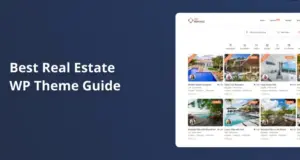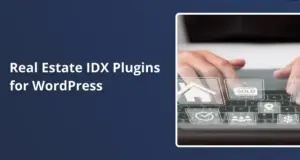The real estate industry has undergone significant digital transformation over the past decade, with WordPress emerging as a pivotal platform driving this evolution.
WordPress has democratized website creation as an open-source content management system (CMS), enabling real estate professionals to build robust, SEO-optimized, and user-friendly websites without requiring extensive technical expertise.
By offering customizable themes, specialized plugins, and seamless integration with Multiple Listing Services (MLS), WordPress has redefined how properties are marketed, transactions are managed, and client interactions are facilitated.
In this article, we explore WordPress’s multifaceted impact on the real estate sector, analyzing its role in enhancing operational efficiency, improving search engine visibility, and fostering innovation in property management and client engagement strategies.
WordPress as a Foundation for Real Estate Digital Presence
The Rise of WordPress in Real Estate Web Development
WordPress’s dominance in the real estate sector stems from its adaptability and scalability. Initially designed as a blogging platform, WordPress evolved into a full-fledged CMS capable of supporting complex real estate websites.
Its open-source nature allows developers to create tailored solutions, while its user-friendly interface empowers agents and brokers to manage content independently.
A critical advantage of WordPress is its cost-effectiveness. Traditional custom website development for real estate could cost tens of thousands of dollars, but WordPress themes and plugins drastically reduce expenses.
For instance, premium themes like WpResidence offer pre-built templates optimized for property listings, reducing development time and costs. Furthermore, WordPress’s extensive documentation and community support lower the barrier to entry, allowing even small agencies to compete with larger firms in online visibility.
Customization and Branding Capabilities
WordPress’s theme ecosystem has been instrumental in enabling real estate businesses to establish distinct brand identities. Themes such as ours provide modular designs that can be customized to align with agency branding, from color schemes to typography.
We include drag-and-drop page builders like Elementor, allowing non-technical users to create visually appealing layouts without coding.
The platform’s flexibility extends to listing management. Real estate WordPress Themes like WpResidence allow agents to define custom property attributes—such as square footage, number of bedrooms, and proximity to amenities—and display them using dynamic filtering systems.
This capability ensures that potential buyers can refine searches based on specific criteria, enhancing user experience and increasing the likelihood of conversions.
Enhancing Search Engine Visibility Through WordPress
SEO-Friendly Architecture
WordPress’s inherent SEO advantages have made it a preferred choice for real estate websites. The platform generates clean, semantic code that search engine crawlers can easily index, while features like automatic XML sitemap generation and canonical URLs prevent duplicate content issues.
Themes optimized for speed and mobile responsiveness further contribute to higher search rankings, as Google’s algorithms prioritize fast-loading, mobile-friendly sites.
Plugins like Yoast SEO and Rank Math provide granular control over on-page optimization. Real estate agents can optimize meta titles, descriptions, and schema markup for individual property pages, improving click-through rates from search results.
For instance, a properly optimized listing page for “luxury condos in Miami” could appear in rich snippets, showcasing price ranges, availability, and ratings directly in search results.
Local SEO and Hyper-Targeted Content
Real estate is inherently local, and WordPress excels in local SEO strategies. Plugins like WPML (WordPress Multilingual) enable agents to create region-specific content versions catering to multilingual markets.
Integration with Google My Business (GMB) through plugins like WP Business Review allows agencies to display client testimonials and ratings on their websites, boosting local search credibility.
Moreover, WordPress’s blogging capabilities facilitate content marketing strategies tailored to local audiences. Agents can publish neighborhood guides, market trend analyses, and home-buying tips, positioning themselves as local experts.
For example, a blog post titled “Top 10 Family-Friendly Neighborhoods in Austin” incorporating long-tail keywords can attract organic traffic from prospective buyers.
Integration with MLS and IDX Systems
Bridging the Gap Between Listings and Websites
Integrating Internet Data Exchange (IDX) systems with WordPress has revolutionized how real estate websites display live MLS data. Plugins like MLSImport solution enable agents to embed searchable MLS listings directly into their WordPress sites. These plugins use RESTful APIs to pull real-time data, ensuring that property availability, pricing, and details remain up-to-date.
Advanced IDX solutions offer features such as saved searches, where users receive email alerts when new properties matching their criteria are listed. For instance, the Responsive Mortgage Calculator plugin allows visitors to estimate monthly payments based on current interest rates, enhancing user engagement.
Operational Efficiency and Client Relationship Management
Automated Transaction Management
WordPress plugins have automated many aspects of real estate transactions, reducing administrative burdens. WP ERP integrates customer relationship management (CRM), accounting, and project management tools into a single dashboard, allowing agents to track leads, manage contracts, and invoice clients without switching platforms.
All professional real estate themes enhance client interactions by enabling front-end property submissions. Homeowners can upload listings with photos and descriptions, which agents can review before publishing. This self-service feature accelerates the listing process while maintaining quality control.
Lead Generation and Nurturing
Lead capture tools embedded in WordPress themes convert visitors into prospects. Plugins like OptinMonster custom integration for HubSpot CRM can create strategically placed opt-in forms offering free home valuations or market reports.
Once captured, leads are automatically segmented based on criteria like budget or preferred location, allowing for personalized follow-ups.
Membership plugins such as WP-Members facilitate recurring revenue models. Agents can offer premium content—such as exclusive listings or investment guides—through subscription plans, creating an additional income stream while nurturing long-term client relationships.
Challenges and Limitations
Plugin Compatibility and Performance Issues
Despite its advantages, WordPress’s reliance on third-party plugins can lead to compatibility issues. A theme update might break a critical plugin, requiring developer intervention. For example, conflicts between WooCommerce and specific IDX plugins have been reported, disrupting e-commerce functionalities on real estate sites.
Poorly coded plugins can also cause performance bottlenecks. High-resolution image galleries and virtual tours may slow page load times, negatively impacting SEO rankings. Solutions like WP Rocket for caching and Smush for image optimization are often necessary to maintain site speed.
Security Vulnerabilities
As the most widely used CMS, WordPress is a frequent target for cyberattacks. Real estate websites storing sensitive client data—such as purchase agreements or financial documents—must implement robust security measures.
Plugins like Wordfence and Sucuri provide firewall protection and malware scanning, but agencies must regularly update core files and plugins to mitigate risks.
Future Trends and Innovations
AI-Powered Property Recommendations
Emerging AI plugins for WordPress are poised to transform property discovery. Machine learning algorithms analyze user behavior—such as time spent on listing pages or clicked amenities—to generate personalized recommendations. For example, a buyer viewing three-bedroom homes in school districts might receive automated emails highlighting similar properties.
Virtual and Augmented Reality Integrations
Integrating VR and AR technologies with WordPress enhances virtual property tours. Plugins like Matterport allow agents to embed 3D walkthroughs directly into listing pages, enabling remote buyers to explore homes in immersive detail. AR plugins overlay furniture or renovation ideas onto empty spaces, helping buyers visualize possibilities.
Blockchain for Secure Transactions
Blockchain-based plugins are being developed to streamline real estate transactions on WordPress platforms. Smart contracts can automate title transfers and escrow processes, reducing fraud risks.
For instance, a plugin might interface with Ethereum-based systems to facilitate instant payment upon contract fulfillment.
Final Words
WordPress has indelibly transformed the real estate industry by providing accessible, cost-effective tools for digital marketing, transaction management, and client engagement.
Its ecosystem of themes and plugins has empowered agents to compete in an increasingly online marketplace, while SEO and IDX integrations ensure maximum visibility for listings. However, challenges like plugin dependency and security require ongoing vigilance. As AI, VR, and blockchain technologies









